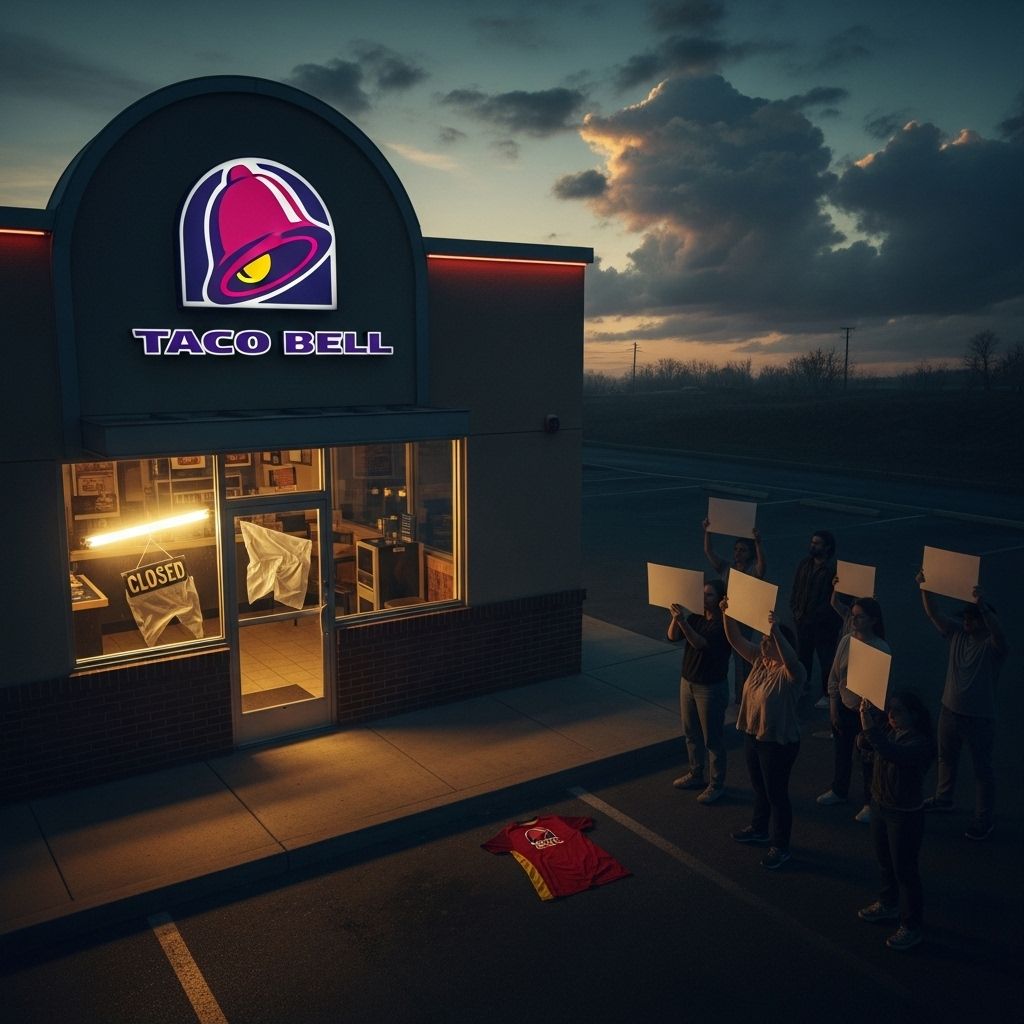RIP Taco Bell? Social Media Rallies for Workers Over Walkout and Boycotts
A Taco Bell employee walkout sparks viral homemade recipes, boycotts, and a nationwide call for respect in the fast-food industry.

When a group of Taco Bell employees staged a walkout to protest poor working conditions and lack of respect at a Kansas City location, their story quickly echoed beyond the fast-food chain’s dining rooms. Public outrage spilled onto social media, igniting a movement that involved homemade recipe sharing, calls for company boycotts, and fresh scrutiny of labor conditions in America’s quick-service restaurants. In this article, we explore the events that sparked the “RIP Taco Bell” wave online, the broader significance for labor rights in fast food, and how loyal fans are reimagining their favorite menu items in solidarity with employees.
Table of Contents
- The Walkout that Sparked a Viral Movement
- How Social Media Fueled the “RIP Taco Bell” Hashtag
- Homemade Recipes: Boycotting with Creativity
- Public Support and Consumer Backlash
- Labor Rights and the Fast Food Industry
- Historical Context: Other Taco Bell Boycotts
- How to Support Fast Food Workers
- Frequently Asked Questions
The Walkout That Sparked a Viral Movement
On a busy Thursday, employees at a Kansas City Taco Bell made headlines by staging a walkout in the middle of the lunch rush, leaving the restaurant shuttered and customers turned away. Shift leader Fran Marion and three colleagues made the difficult decision to leave their posts, taping a handmade sign to the door: “Closed due to STRIKE!”
The protest, organized with support from the workers’ rights group Stand Up KC, focused on a range of issues:
- Abusive customers and disrespectful management
- Short staffing and lack of paid sick days
- Low wages falling short of a living wage
- Poor and unsafe working conditions, including incidents like flooded floors after equipment failures
Marion and her coworkers described the cumulative strain of these conditions. In one reported incident, the restaurant was flooded after a malfunction, but employees trying to close the store for safety were reprimanded instead of supported.
Perspective from the Front Line
Terrence Wise, another shift leader at the store and a vocal advocate for workers’ rights, stated, “We wanted something that had nothing to do with money or union rights. We want respect, and that’s what we’ve been dealing with at this Taco Bell: a lot of lack of respect.” Employees and their supporters have raised concerns not only about low pay and the absence of union representation but also about persistent disrespect and racist comments in the workplace.
Though the direct walkout was limited to Kansas City, the issues highlighted are endemic across the industry, fueling a much larger discussion online.
How Social Media Fueled the “RIP Taco Bell” Hashtag
The walkout story quickly migrated to Twitter and other major social platforms, where it was amplified under hashtags like #RIPTacoBell and #BoycottTacoBell. Supporters, activists, and ordinary fast food fans voiced solidarity with the employees, rallying for better working conditions and dignity for all fast food workers.
- Hashtags such as #SupportWorkers and #FightFor15 trended alongside calls to boycott Taco Bell.
- Social media users widely shared news reports, testimonials from workers, and calls for both corporate accountability and systemic industry change.
- In response, a creative trend began circulating: homemade Taco Bell recipes as an alternative to eating at the chain during the boycott.
The digital groundswell demonstrated how local labor actions can turn into national—and sometimes global—rallies for economic and social justice.
Homemade Recipes: Boycotting with Creativity
As calls to boycott Taco Bell gained traction, home cooks and amateur chefs began recreating their fast food favorites in kitchens across America. Sharing recipes and photos on Twitter, Instagram, and TikTok, supporters highlighted solidarity through culinary creativity:
- Twitter users posted recipes for homemade Crunchwrap Supremes, Quesaritos, and chalupas, often accompanied by messages of worker solidarity.
- Some shared step-by-step videos, inviting friends to join group cooking sessions themed around “Taco Bell at Home Night.”
- Successful recipes were celebrated, with users noting that making Taco Bell-style meals at home was cheaper, more fun, and claimed to taste even better than the chain’s offerings.
- A few viral posts included unique spins and healthier alternatives, further fueling the trend of skipping the drive-thru.
This “homemade fast food” movement turned a boycott from a passive act of avoiding purchases into an active, positive community experience—and a creative way to keep the conversation about workers’ rights alive.
Sample Viral Recipe Tweet
“@username: Made my own Crunchwrap Supreme tonight—better than Taco Bell’s and with a side of solidarity. #RIPTacoBell #SupportWorkers”
Public Support and Consumer Backlash
The public outcry following the Kansas City walkout went beyond social media activism. News outlets and influencers amplified the story, and some previously loyal Taco Bell fans openly declared they would no longer patronize the chain until changes were made.
- Some expressed disappointment at Taco Bell management’s lack of response, vowing to redirect their business to local restaurants or chains with stronger labor policies.
- Others characterized the walkout as a symptom of deeper structural problems in fast food, with poor treatment of employees now a deciding factor in their meal choices.
- Several advocacy organizations called for broader industry reforms and proposed that consumers “vote with their wallets” by supporting ethical companies.
Meanwhile, some dissenting voices questioned whether boycotts would hurt frontline workers more than corporations; however, proponents of the boycott emphasized its symbolic and practical value in bringing workplace issues to public attention.
Labor Rights and the Fast Food Industry
The walkout and subsequent boycott renew focus on long-standing issues facing fast food workers:
- Low wages: Missouri’s minimum wage is $11.15, with workers now agitating for a rise to $15 and, in some cases, $22 per hour.
- Unsafe or unhealthy conditions: Employees report dangerous situations—equipment failures, flooded floors—without adequate managerial support or recourse.
- Lack of sick leave or health benefits: Absence of paid sick days forces workers to choose between health and wages.
- Disrespect and harassment: Many employees cite disrespect from both management and customers as a major issue.
- Unionization efforts: Inspired by successful union drives at other major chains, some Taco Bell employees are weighing unionization as a means to secure lasting improvements.
Broader Industry Trends
This protest follows similar movements at other fast food giants, including Starbucks and McDonald’s, where employees have walked off the job to demand safer, fairer workplaces and higher wages. In several cases, these actions have brought real changes, such as increases in minimum wage for state workers or legislative pushes for industry-wide reform.
Historical Context: Other Taco Bell Boycotts
This is not the first time Taco Bell has faced widespread calls for consumer action. Previous boycotts have centered on other labor issues, such as:
- University students leading campus-wide boycotts in response to supply chain concerns and allegations of substandard worker rights at associated tomato farms.
- The notable Immokalee Workers boycott, where farmworkers organized a campaign that led to concessions from Taco Bell’s parent company, Yum! Brands, around fairer pay and working conditions.
- Some ongoing calls for boycotts based on international political or ethical concerns, targeting investments and actions of the parent company.
These movements have at times led to real negotiation, improvements in supply chain monitoring, and changes in corporate policy. They also underscore the potential impact of grassroots activism and consumer pressure on multinational corporations.
How to Support Fast Food Workers
If you’re inspired to support fast food workers—at Taco Bell or elsewhere—there are several concrete steps you can take:
- Boycott when called for: Honor requested boycotts and share verified information about their goals.
- Elevate worker voices: Retweet, repost, and amplify authentic accounts from frontline workers.
- Support worker unions: Donate to or follow organizations like Stand Up KC or national labor groups.
- Choose ethical dining options: Patronize businesses with a history of treating employees fairly or that are worker-owned.
- Stay informed: Read up on the labor policies of your favorite chains and consider their track records when making dining decisions.
- Contact corporate offices: Write letters or emails letting brands know what changes you wish to see as a consumer.
Frequently Asked Questions (FAQs)
What led to the Taco Bell walkout in Kansas City?
A combination of poor working conditions, low wages, abusive customers, and disrespectful management drove employees at one Kansas City Taco Bell to stage a walkout, demanding respect and safer conditions.
How did social media influence the boycott?
Hashtags like #RIPTacoBell gathered steam as users shared the walkout story and expressed solidarity; many supporters posted homemade Taco Bell recipes to substitute dining at the chain, keeping momentum for the boycott going strong.
What actions can consumers take to support fast food workers?
Consumers can join boycotts, amplify worker’s voices online, choose ethical restaurants, support unionization efforts, and directly contact companies to advocate for better labor practices.
Are homemade Taco Bell recipes easy to make?
Many social media users have reported that recreating menu favorites at home is not only possible but fun and economical, often resulting in tastier, customizable meals.
Has Taco Bell responded to employee protests?
At the time of the initial walkout, the company owning the affected franchise reportedly did not provide comment; public pressure continues to mount for a formal and constructive response.
What broader issues does this event highlight?
The walkout spotlights persistent challenges in the fast food industry, including wage stagnation, lack of health benefits, workplace safety concerns, and the struggle for respect and representation on the job.
References
- https://www.kcur.org/news/2022-09-01/taco-bell-staff-walk-out-of-kansas-city-restaurant-we-wanted-to-be-treated-like-human-beings
- https://www.business-humanrights.org/en/latest-news/students-urge-taco-bell-boycott-usa/
- https://www.threads.com/@cafastfoodunion/post/DFg_yR0vIEW?hl=en
- https://boycott.thewitness.news/target/tacobell
- https://monthlyreview.org/articles/immokalee-workers-take-down-taco-bell/
Read full bio of medha deb












